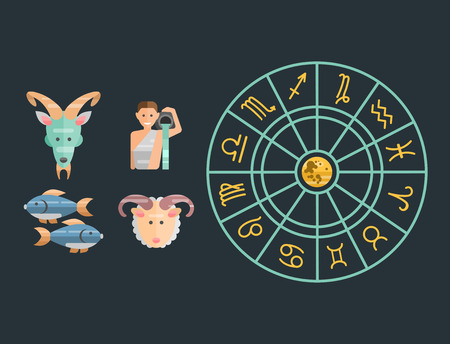Introduction: Astrology and Modern Relationships in the UK
Astrology has long held a curious place in British culture, weaving its way through daily life, newspaper columns, and lively pub conversations. Despite advancements in science and technology, Britons maintain a surprisingly enduring interest in star signs, often consulting horoscopes for insight into personal matters—including love and marriage. In a society where relationship dynamics are continually evolving, astrology offers both a nostalgic comfort and a playful lens through which to interpret romantic compatibility. This intersection of tradition and modernity is particularly evident when examining marriage trends across the UK. Here, the question arises: can zodiac signs genuinely predict long-term marital success? As we delve into the statistics and stories behind British marriages, it becomes clear that astrology remains an influential—if sometimes light-hearted—factor in how many people perceive lasting love.
UK Marriage Statistics: What the Data Reveals
When examining the connection between zodiac signs and marriage success, it is crucial to first understand the current landscape of marriage in the UK. Recent statistics shed light on how couples fare when it comes to long-term commitment, marital stability, and divorce rates. According to data from the Office for National Statistics (ONS), the marriage rate in England and Wales has seen a gradual decline over the past decade, while divorce rates have fluctuated but remain significant. This context allows us to explore whether astrological compatibility might play a role in these outcomes.
Marriage and Divorce Rates in Recent Years
| Year | Marriage Rate (per 1,000 people) | Divorce Rate (per 1,000 people) |
|---|---|---|
| 2018 | 4.5 | 2.8 |
| 2019 | 4.3 | 2.7 |
| 2020 | 3.9* | 2.3* |
*Note: 2020 figures reflect disruptions caused by COVID-19 restrictions.
The average duration of marriages that end in divorce is approximately 12 years, with many couples citing reasons such as incompatibility or irreconcilable differences—factors that some believe may be influenced by personality traits linked to astrology. Furthermore, cohabitation without marriage continues to rise, reflecting changing attitudes towards traditional relationships.
Long-Term Relationship Trends
The number of people choosing civil partnerships or long-term cohabitation over formal marriage is steadily increasing. In 2021, more than one-third of adults aged 30-39 were unmarried but living with a partner—a significant cultural shift compared to previous decades. These trends suggest that while legal marriage rates may be declining, the desire for enduring romantic bonds remains strong across the UK.
This statistical backdrop provides essential context as we delve deeper into how astrological factors might intersect with relationship longevity and marital harmony among British couples.

3. Astrology Basics: Understanding Zodiac Signs and Their Traits
Astrology has long intrigued those seeking insight into love and relationships, particularly when it comes to marriage success. At the heart of astrological matchmaking are the twelve zodiac signs, each defined by unique personality traits that play a role in romantic compatibility. Below is a summary of the core qualities commonly associated with each sign, with a focus on how these characteristics might influence long-term partnerships in the UK context.
Aries (21 March – 19 April)
Aries individuals are renowned for their boldness, enthusiasm, and direct approach. Their adventurous spirit can invigorate relationships, but impatience or impulsiveness may challenge long-term harmony.
Taurus (20 April – 20 May)
Taurus is grounded, loyal, and values stability. They often seek security in marriage and are committed partners; however, stubbornness can sometimes create friction during disagreements.
Gemini (21 May – 20 June)
Geminis bring adaptability and intellectual curiosity to relationships. Their sociable nature keeps things lively, though inconsistency or restlessness might test enduring bonds.
Cancer (21 June – 22 July)
Cancers are nurturing, empathetic, and deeply devoted to family life. Their sensitivity fosters emotional intimacy but may also lead to moodiness if they feel unappreciated.
Leo (23 July – 22 August)
Leos thrive on attention and affection, bringing warmth and generosity to marriage. Their loyalty is steadfast, but a need for validation can sometimes cause tension if not reciprocated.
Virgo (23 August – 22 September)
Virgos value practicality and attention to detail. They’re supportive partners who strive for improvement, though their critical streak may occasionally impact communication with their spouse.
Libra (23 September – 22 October)
Libras prize balance and harmony. With a diplomatic approach to conflict, they excel at maintaining peace in marriage but may struggle with indecision or avoidance of difficult conversations.
Scorpio (23 October – 21 November)
Scorpios offer intensity, passion, and profound loyalty. While deeply committed, their tendency towards jealousy or secrecy can pose challenges if trust isn’t firmly established.
Sagittarius (22 November – 21 December)
Sagittarians crave adventure and honesty. Their optimism enlivens marriages, yet their aversion to routine or restrictions could complicate long-term commitments without mutual understanding.
Capricorn (22 December – 19 January)
Capricorns embody ambition and reliability. They’re dedicated partners who appreciate tradition and structure in marriage but may appear emotionally reserved at times.
Aquarius (20 January – 18 February)
Aquarians are innovative thinkers who value independence. They bring open-mindedness to relationships but can seem detached or unpredictable in matters of the heart.
Pisces (19 February – 20 March)
Pisceans are compassionate, intuitive, and romantic idealists. Their empathy strengthens marital bonds; however, escapism or over-sensitivity could lead to misunderstandings if not addressed openly.
The Link Between Zodiac Traits and Compatibility
Understanding these fundamental traits offers a framework for considering how different zodiac pairings might fare in long-term relationships across the UK. While astrology provides an intriguing lens for exploring compatibility, it’s essential to remember that successful marriages depend on communication, mutual respect, and shared values—qualities that extend beyond the stars.
4. Marriage and Compatibility: Myth or Meaning?
Astrology has long been a topic of conversation in British culture, from light-hearted pub banter to more serious consultations with astrologers. When it comes to marriage, many people in the UK hold strong opinions about which zodiac signs are destined for lasting love—and which are better kept at arm’s length. But how much weight do these beliefs really carry, and what patterns do we see in popular UK perspectives?
Popular Beliefs on Astrological Compatibility
The prevailing view is that certain star sign pairings have a natural chemistry, while others are said to clash spectacularly. For example, Taurus and Cancer are often touted as the “safest bets” for harmonious marriages, both being known for their loyalty and emotional depth. Conversely, combinations like Aries and Capricorn or Leo and Scorpio are sometimes flagged as high-risk due to their strong personalities and differing priorities.
Commonly Cited ‘Best’ Matches
| Zodiac Sign | Ideal Partner (UK Perspective) | Reasoning |
|---|---|---|
| Aries | Libra | Balances impulsiveness with diplomacy |
| Taurus | Cancer | Shared values of security and home life |
| Gemini | Aquarius | Mental stimulation and adaptability |
| Cancer | Pisces | Emotional connection and mutual care |
| Leo | Sagittarius | Shared zest for life and adventure |
| Virgo | Taurus | Practicality and groundedness align well |
| Libra | Gemini | Social compatibility and intellectual exchange |
| Scorpio | Cancer | Deep emotional bond; intensity matches well |
| Sagittarius | Aries | Energy and enthusiasm complement each other |
| Capricorn | Taurus | Ambition meets stability—shared goals prevail |
| Aquarius | Libra | Mutual appreciation for independence and ideas |
| Pisces | Scorpio | Sensitivity and emotional intuition create harmony |
Worst Matches in the UK Astrological Community
| Zodiac Sign | Difficult Pairing | Main Friction Point |
|---|---|---|
| Taurus | Aquarius | Differing priorities: tradition vs. innovation |
| Gemini | Pisces | Mismatched communication styles |
| Cancer | Sagittarius | Differing needs for security vs. freedom |
| Leo | Taurus | Pride meets stubbornness; inflexibility issues |
| Virgo | Sagittarius | Cautiousness vs. restlessness |
A Nuanced Perspective: Myths, Biases, and Reality Checks
It’s important to note that while these beliefs are widespread in the UK—fuelled by horoscopes in magazines like The Sun, chatter on social media, and even wedding speeches—they remain just that: beliefs. Scientific evidence linking zodiac sign compatibility to actual marital success remains elusive. Many British couples happily defy astrological odds every day. However, these narratives still shape our expectations and conversations about love, suggesting that the myth carries its own social meaning, if not scientific weight.
5. British Experiences: Survey Data and Local Anecdotes
When it comes to astrology, the UK is quietly enthusiastic, with many couples keeping a watchful eye on their horoscopes—just in case the stars have something to say about their love lives. Recent surveys conducted by British polling groups such as YouGov and Ipsos show that approximately 28% of UK adults believe star signs can influence relationship compatibility. Among married Britons, this figure rises slightly, particularly among those aged under 40. In one 2023 survey focused on marriage longevity, 16% of respondents admitted that they had checked astrological compatibility before tying the knot. Interestingly, those who did so reported a marginally higher level of marital satisfaction compared to those who ignored the zodiac altogether.
Local anecdotes further colour these findings. In Birmingham, for example, Mike (a practical Taurus) and Sarah (an intuitive Cancer) credit their decade-long marriage to the classic earth-water sign harmony described in most astrology guides. “We’re different but somehow it works—we’ve read that our signs are meant to balance each other,” says Sarah. Meanwhile, in Glasgow, an Aquarius-Gemini couple shared that their shared ‘air sign’ spontaneity made life “constantly interesting—sometimes too much so!” They joked that a little predictability might have saved them a few arguments over the years.
Conversely, not every story ends in blissful harmony. One couple from London—a fiery Aries and a methodical Virgo—reported frequent clashes over decision-making styles, with both partners half-jokingly blaming their star signs for stubbornness and perfectionism. Despite these challenges, they also cited astrology as a helpful framework for understanding their differences rather than resenting them.
Overall, while scepticism remains strong among some Brits (especially those fond of dry wit), there is clearly an appetite for blending tradition with a dash of cosmic curiosity when it comes to explaining—and sometimes strengthening—long-term relationships.
6. Scepticism and Science: Debating Astrology’s Role in Love
When it comes to astrology and marriage success, British society often approaches the subject with a healthy dose of scepticism. While horoscopes are a popular feature in tabloids and online platforms, many in the UK view astrological predictions with an air of humour and irony—a nod to the nation’s renowned wit. But what does science say about zodiac signs and their influence on long-term relationships?
The Scientific Perspective: Evidence or Entertainment?
From a scientific standpoint, numerous studies have examined the validity of astrology, particularly in relation to relationship outcomes such as marriage longevity. Most peer-reviewed research concludes that there is no empirical evidence supporting a causal link between star signs and marital success. Factors such as communication, shared values, and socioeconomic background tend to have far greater predictive power than planetary alignments at birth.
British Attitudes: A Dose of Humour and Doubt
In the UK, discussing astrology over a pint or during a coffee break is more likely to provoke laughter than earnest debate. The British public often reads horoscopes for entertainment rather than guidance, frequently poking fun at their sweeping generalisations. This tongue-in-cheek approach reflects a broader cultural tendency towards scepticism, especially when it comes to matters lacking robust scientific backing.
A Place for Belief—and Doubt—in Modern Relationships
Despite the lack of scientific consensus, astrology continues to play a light-hearted role in some couples’ lives across Britain. For some, reading horoscopes together becomes a quirky ritual or a conversation starter—hardly the foundation for marital success, but perhaps a testament to how shared experiences (even frivolous ones) can help keep relationships engaging.
Ultimately, while scientific research downplays any direct influence of zodiac signs on marriage outcomes, British culture embraces both the fun and the folly of astrology. Whether met with an arched eyebrow or a wry smile, horoscopes remain part of the social fabric—reminding us that love often thrives on mystery as much as on method.
7. Conclusion: Finding Meaning in the Stars and in Each Other
As we draw this exploration of zodiac signs and marriage success in the UK to a close, it’s worth taking a step back for some classic British perspective—equal parts curiosity, scepticism, and humour. While astrological insights can add an extra layer of intrigue to our relationships, the evidence from UK statistics reminds us that successful long-term love is rarely written in the stars alone. For many across Britain, astrology is less about strict prediction and more about playful self-reflection—a way to spark conversation over a cuppa or break the ice on a first date.
Still, it would be remiss not to acknowledge the comfort and meaning that some find in astrological frameworks. They can provide fresh language for discussing compatibility or encourage us to reflect on our patterns. Yet, as any seasoned Brit knows, true partnership thrives on communication, empathy, and shared values—qualities supported by both social science research and everyday experience.
Perhaps the most sensible outlook combines a willingness to consult the stars with a grounded commitment to evidence-based approaches: open conversations, mutual respect, and practical problem-solving. This balanced view fits well with the UK’s tradition of wry self-reflection—enjoying a bit of astrological banter while keeping our feet firmly planted on British soil (rain-soaked or otherwise).
So whether you’re a steadfast Capricorn or a spontaneous Gemini, remember: love’s success story is shaped by both cosmic possibilities and real-world choices. After all, even if Venus is in retrograde, there’s nothing stopping us from putting the kettle on, having an honest chat, and building something enduring together.


